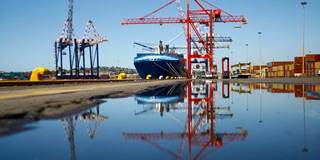Progressives should not buy into a false and counter-productive narrative that sets the interests of the global poor against the interests of rich countries’ lower and middle classes. With sufficient institutional imagination, the global trade regime can be reformed, to the benefit of both.
CAMBRIDGE – The global trade regime has never been very popular in the United States. Neither the World Trade Organization nor the multitudes of regional trade deals such as the North American Free Trade Agreement (NAFTA) and the Trans-Pacific Partnership (TPP) have had strong support among the general public. But opposition, while broad, was diffuse.
The difference today is that international trade has moved to the center of the political debate. The US presidential candidates Bernie Sanders and Donald Trump have both made opposition to trade agreements a key plank of their campaigns. And, judging from the tone of the other candidates, standing up for globalization constitutes electoral suicide in the current political climate.
The populist rhetoric on trade may be excessive, but few deny any longer that the underlying grievances are real. Globalization has not lifted all boats. Many working families have been devastated by the impact of low-cost imports from China and elsewhere. And the big winners have been the financiers and skilled professionals who can take advantage of expanded markets. While globalization has not been the sole (or even the most important) force driving inequality in the advanced economies, it has been a contributor.

CAMBRIDGE – The global trade regime has never been very popular in the United States. Neither the World Trade Organization nor the multitudes of regional trade deals such as the North American Free Trade Agreement (NAFTA) and the Trans-Pacific Partnership (TPP) have had strong support among the general public. But opposition, while broad, was diffuse.
The difference today is that international trade has moved to the center of the political debate. The US presidential candidates Bernie Sanders and Donald Trump have both made opposition to trade agreements a key plank of their campaigns. And, judging from the tone of the other candidates, standing up for globalization constitutes electoral suicide in the current political climate.
The populist rhetoric on trade may be excessive, but few deny any longer that the underlying grievances are real. Globalization has not lifted all boats. Many working families have been devastated by the impact of low-cost imports from China and elsewhere. And the big winners have been the financiers and skilled professionals who can take advantage of expanded markets. While globalization has not been the sole (or even the most important) force driving inequality in the advanced economies, it has been a contributor.